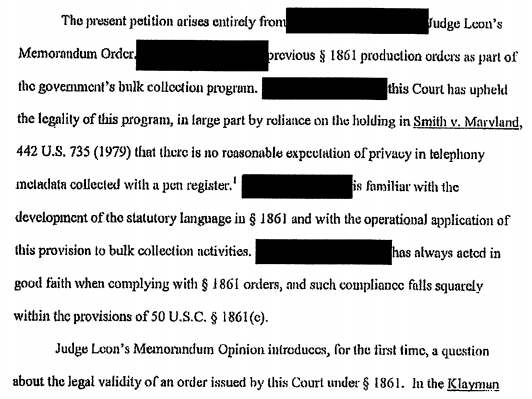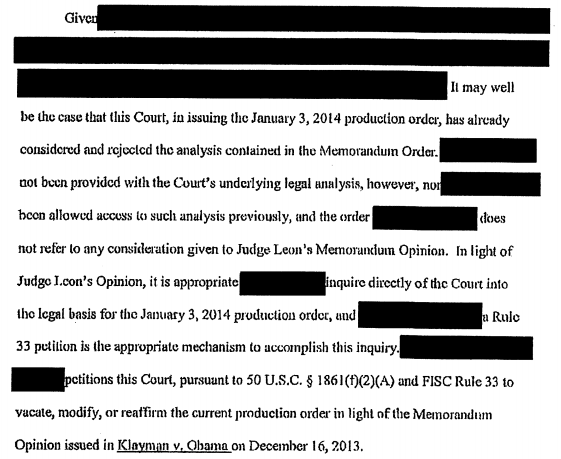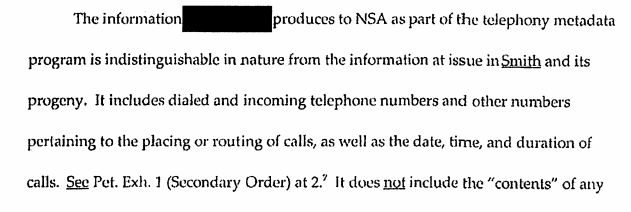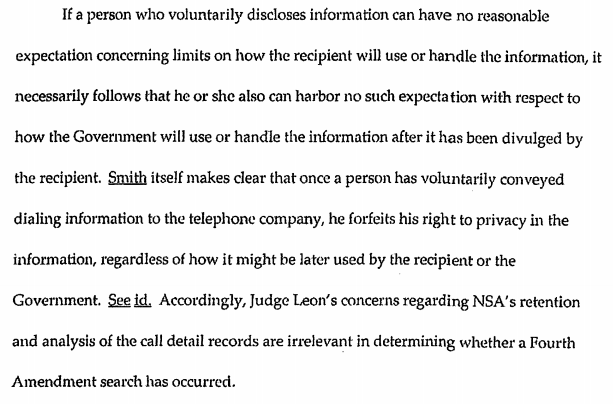In December Federal Judge Richard Leon indicated that in his estimation, the bulk collection of telephony metadata by the NSA was likely unconstitutional. He stayed his ruling, however, citing “significant national security interests” and “the novelty of the constitutional issue” at play.
Less than two weeks later, an opposite ruling was handed down, calling the program constitutional.
Given the first challenge, a United States-based telecommunications firm [REDACTED] that has to comply with the program specifically requested that the Foreign Intelligence Surveillance Court (FISC) explain its perspective on the ruling.
This was minor dissent.
Here’s [REDACTED] indicating that it intended to comply with the program, and that it was not requesting a hearing:

Sleuths have posited that either AT&T or Sprint are the best fits for amount of space that was redacted. I’ll leave that to you.
Why does the telco [REDACTED] want more information regarding the thoughts of the FISC? It boils down to the arguments that Judge Leon brought up — if they are valid, it could make the program that the telco [REDACTED] serves illegal. Taking part in the bulk collection of telephonic metedata, even under compulsion, wouldn’t be the best idea if that was the case.
Here are the two key pieces:

And:

So, in short, the telco [REDACTED] wants to understand the logic behind the continuance of a program that has suffered its first real challenge. In terms of pushback, this feels quite gentle, but is also quite welcome.
The response that [REDACTED] got is worth reading.
Unsurprisingly, the government disagreed with Judge Leon. Judge Rosemary Collyer, after determining standing, took exception with Judge Leon’s analysis, heavily citing Smith v. Maryland as the foundation for its view.
According to Judge Collyer, the Smith ruling matters as precedent in this case given its close parallel:

As TechDirt notes, this feels somewhat awry, given that the Smith case dealt with one person, and the NSA’s programs with everyone. To then call the two “indistinguishable” feels somewhat woody.
Judge Collyer also detailed the third-party doctrine, which indicates that expectations of privacy are forfeited when information is shared with a third-party. If you share it, your expectation goes away, and thus the government can’t illegally search that information, essentially, as it wouldn’t be a search in the technical sense if it did.
Given that, Judge Collyer wrote the following:

Essentially the government thinks that legal precedent is set. Read the document if you want a look into how the government explains its own defense of its actions. That’s something worth understanding.
IMAGE BY FLICKR USER Craig Pennington UNDER CC BY 2.0 LICENSE (IMAGE HAS BEEN CROPPED)
